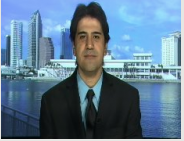President Hassan Rouhani contradicted Iran's Supreme Leader, Ayatollah Ali Khamenei's remarks about the potential rapprochement between the US and the Islamic republic.
Although, Mr. Khamenei continues to reject the idea that there would be any additional detente between Tehran and Washington, Iran's latest tactical shift in its foreign policies and priorities, as well as, Rouhani's message at the United Nations general assembly suggested a different landscape.
Although Iranian leaders' speeches are just a collection of words rather than actions, if we analyze Rouhani's speech meticulously, the broader tone of his remarks suggested two major and intriguing issues. First of all, the general tone was of Tehran's willingness to further engage with the West and the United States.
The engagement appears to be on two levels: economic and geopolitical. Rouhani suggested that his country is prepared to make Iran a business hub in the region by increasing economic deals between Iran, the West and other nations. This shows that Rouhani, under the supervision of the Supreme Leader, is putting economic and national interests ahead of ideological interests.
Secondly, Rouhani depicted Iran as a country which is fighting terrorism and is willing to cooperate with the international community to resolve conflicts in the region and defeat terrorism. In other words, Rouhani is attempting to ratchet up the Islamic Republic's global and regional legitimacy without mentioning Iran's role in Syria, Lebanon, Iraq, Yemen, and without attracting attention on the function of Quds influence ( a foreign branch of Iran's Revolutionary Guard Corps which operates in foreign countries) in fueling conflicts in the region through military operations, fundings or sectarian agendas.
Prioritizing Economy Over Ideology?
Tehran's increased geopolitical legitimacy on the global stage -- which is projected and orchestrated by Iranian leaders and indirectly facilitated by the Obama administration's foreign policy towards Tehran -- can have significant impacts on Iran's embattled economy, causing it to revive in a faster time.
Western countries are more willing to conduct business deals with Iran when Tehran's legitimacy is viewed as being restored. This legitimacy is validated by the Obama administration view of Iran as a significant player as well as having a constructive role in resolving conflicts and fighting terrorism. As President Obama pointed out to the world leaders gathered at the United Nations General Assembly, "The United States is prepared to work with any nation, including Russia and Iran, to resolve the conflict."
On the other hand, since the U.S does not have clear and detailed policy towards the conflicts in the Middle East, and since the U.S policy is currently anchored in the wait-and-see foreign policy, Washington is more willing to delegate the task of fighting the Islamic State or resolving the crisis in Syria and Yemen, to Tehran and Moscow or other nations. This suggests that the Obama administration will continue to indirectly ratchet up the Islamic Republic's global legitimacy and projection of power in order to fulfill Washington's unwillingness to take decisive actions.
Why Iran Does Iran Still Slam U.S.?
Some politicians, scholars and policy analysts might make the argument that Rouhani is not sending signs of further cooperation between Tehran and Washington since he slammed the US over the conflicts in the region. The argument goes that the Supreme Leaders speeches clearly indicate that there would be no further rapprochement.
We need to remember that Iran's Supreme Leader previously drew several red lines regarding the nuclear deal -- before it was reached between the six world powers and the Islamic Republic -- but most of those red lines were crossed.
Mr. Khamenei's public statements do not genuinely reflect the way he instructs his president and senior cadre of IRGC in private. In public, Khamenei has to reiterate the Islamic Republic's anti-American policies due to the fact that he needs to satisfy and fulfill his social base's revolutionary principles. In addition, Rouani needs to satisfy the critics at home by criticizing the U.S. and other countries in the region.
It is accurate to observe that Khamenei is instructing the president's team to prioritize national and economic interests over the revolutionary ones. This is due to the fact that the nuclear deal and Iran's change of tone on the global stage would not have been possible without a green light from Mr. Khamenei. Every crucial foreign policy issue enacted by the President has to be approved by the Supreme Leader.
Finally, although Iran is prioritizing its economic and national interests over its ideological principles, this does not necessarily mean that Tehran is fundamentally abandoning its revolutionary norms. The Islamic Republic can not afford to leave its revolutionary principles behind because they are the deep-established character of the government, and how it gains its legitimacy.
This revolutionary establishment is even out of the control of the individual, Mr. Khamenei. Putting economic and national interests ahead of the revolutionary ones is a short term tactical shift in order to save the Islamic Republic.
In conclusion, Iran's prioritization of national and economic interests, the US role in indirectly facilitating and ratcheting up Iran's global legitimacy, and the US wait and see foreign policy in the Middle East, suggest that tactical cooperation between Tehran and Washington, and Tehran and West is likely to increase. This increased cooperation will not resolve the crisis in the region since Tehran will not alter its foreign policy objectives and revolutionary norms fundamentally, but the Iran-U.S. cooperation will indeed enhance Iran's global legitimacy.
Dr. Majid Rafizadeh, an American scholar and political scientist, is the president of the International American Council on the Middle East. Harvard-educated, Rafizadeh serves on the advisory board of Harvard International Review. He is originally from Iran and Syria. You can contact him at Dr.rafizadeh@post.harvard.edu or follow him at @majidrafizadeh
This post first appeared on Al Arabiya.

